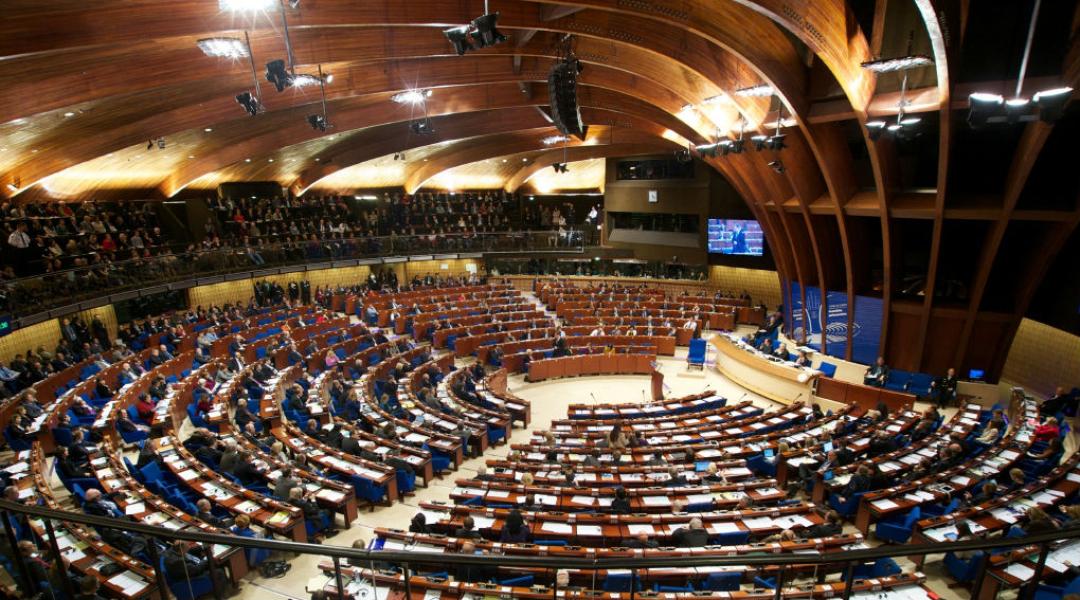
PACE Winter Session opens under Georgian chairmanship

On 27 January, the Parliamentary Assembly of the Council of Europe (PACE) started its Winter Session under the chairmanship of Georgia.
The Assembly decided to hold an urgent debate on the theme “International obligations concerning the repatriation of children from war zones”, as well as a current affairs debate on “Recent developments in Libya and in the Middle East: what [are the] consequences for Europe?”. Debates on the agenda included a complementary joint procedure between the Committee of Ministers and the Assembly in response to a serious violation by a member state of its statutory obligations, the functioning of democratic institutions in Poland, and reported cases of political prisoners in Azerbaijan.
Parliamentarians also discussed threats to media freedom and journalists’ security, a report on “Democracy hacked? How to respond?” and the protection of freedom of religion in the workplace. A report on minimum standards for electoral systems and a report on the observation of elections in Belarus were also on the agenda.
Georgia’s address to PACE
Georgian Minister of Foreign Affairs David Zalkaliani delivered his first speech at PACE as the head of the Committee of Ministers of the Council of Europe, stating that consolidated, international pressure against illegal Russian activities in Georgia and other countries must continue.
“Situation in the Russian-occupied Georgian regions of Abkhazia and Tskhinvali has become worse. Actual annexation and the occupation of Georgian territories by Russia continues,” Zalkaliani said. He stated that “strengthening international pressure on the country which carries out the effective control of Georgian regions, which is Russia, is essential,” he added.
After Zalkaliani, Georgian President Salome Zourabichvili also held a speech. She said that Georgia has made great strides after it became a member of the Council of Europe 20 years ago. “Membership of the Council of Europe marked the start of the path towards the transformation of Georgian society,” she stated. Zourabishvili underlined that the path corresponded to the free choice of the Georgian nation, “a choice that has never faltered, and which is to this day inspiring us and bringing us ever closer to the European integration.”
“Georgia has succeeded to turn itself from a post-soviet state, into an emerging ever stronger and vibrant democracy; Georgia has turned into a modern European state with stronger institutions, free economy, sustained economic growth, developing social and healthcare systems, all in an environment of stability…We know that the end of the road is still not reached, that it will take more political will and readiness to achieve the last wave of reforms. The new constitution adopted in 2018 is a shift to another stage of our democratic development and demonstrates our commitment to human rights protection. In addition to the fundamental rights and freedoms, it has introduced the newest in social, economic and environmental rights,” she said, stressing that environmental rights, especially the protection of individuals against environmental harm, was a priority.
She also said that the main obstacle to democracy in Georgia was the polarisation in political life. “Unacceptance of different opinions, aggression, hate speech – coupled with fake news and disinformation – divide our societies and fuel mistrust. Polarisation creates a fertile ground for outside influence during election campaigns and beyond. This extreme negativism deprives our population of the opportunity to unite around important issues,” she stressed.
Zourabichvili also spoke about the Russian occupation and human rights situation in the occupied territories of Abkhazia and Tskhinvali (South Ossetia) and about Georgia’s peace initiative “A Step to a Better Future.” She also stated that the Geneva International Discussions on Georgian conflict issues “are politically stalled,” while Incident Prevention Mechanisms “are rarely successful” in solving technical, conflict-related issues.
Azerbaijan faces criticism from PACE delegates
On 28 January, the resolution on “Threats to media freedom and the safety of journalists in Europe”, was adopted at PACE. The resolution stated that regarding media freedom and safety of journalists, “the situation is particularly worrying in Azerbaijan, Hungary, Malta, the Russian Federation and Turkey.”
Part of the report’s resolution speaks separately about the situation in Azerbaijan. Baku officials were urged “to [radically] change the “hostile environment that seriously restricts media freedom. In particular, it is necessary to prohibit the use of criminal law with the aim of silencing independent journalists who are systematically threatened with unfounded criminal charges and are trumped up with fabricated evidence,” read the text.
The document concluded: “Azerbaijan is one of the most hostile countries for journalists in terms of litigation, sentencing and imprisonment. Since 2017, 18 criminal cases have been brought against journalists or the media, and their employees have been convicted and imprisoned.”
The head of the Azerbaijani delegation to PACE Samad Seyidov commented on the text of the resolution. He urged the delegates to refrain from such rhetoric. “If you are unable to respect others, the crisis will only intensify,” Seyidov added. “Therefore, I urge my colleagues to refrain from such behaviour. We must think about the future of the organization. We should abandon such rhetoric and only this way we will be able to ensure the future of PACE,” he said.
See Also


Yerevan Balances Strategic Ties with Both US and Russia, Says Foreign Minister

FM Mirzoyan: Peace Deal with Azerbaijan Is Within Reach

Pashinyan and Erdogan Hold Call, Reaffirm Commitment to Ongoing Dialogue

Ilham Aliyev and Masoud Pezeshkian Discuss Development of Bilateral Relations

